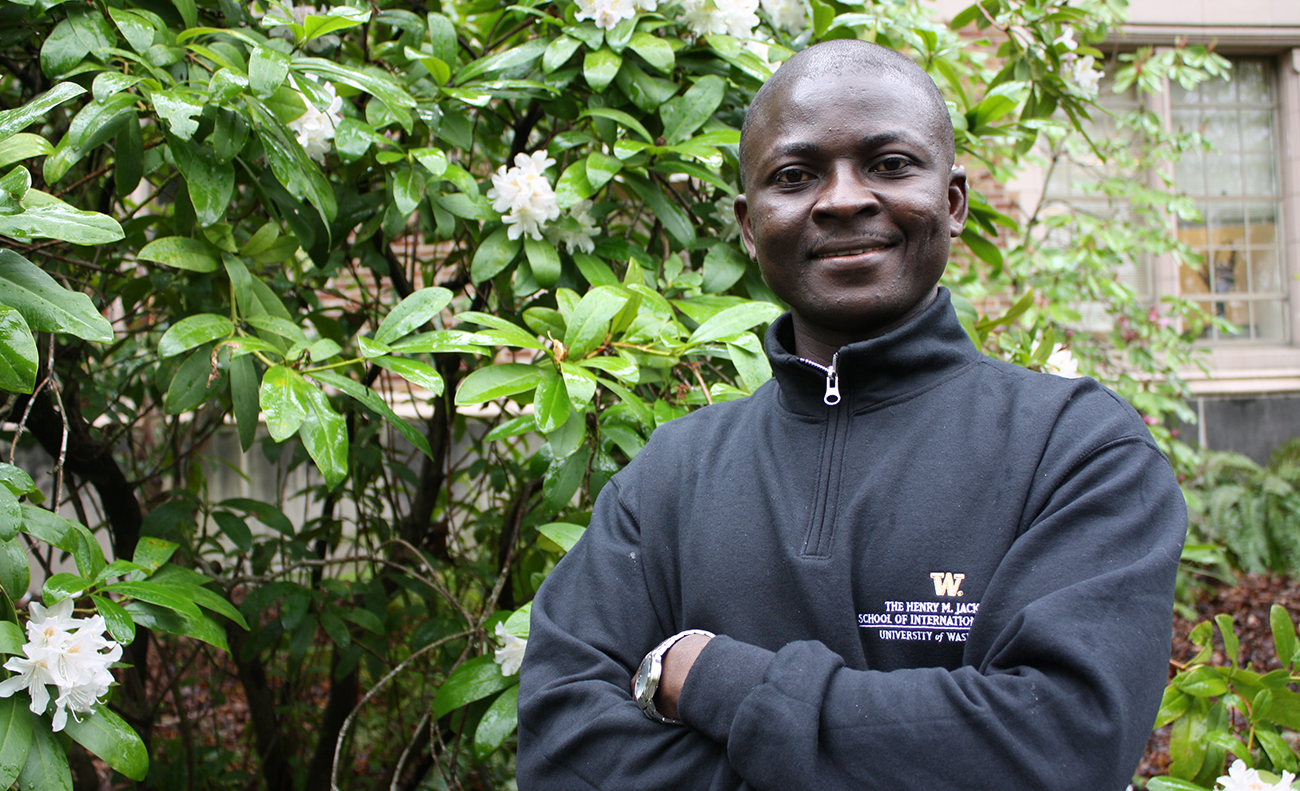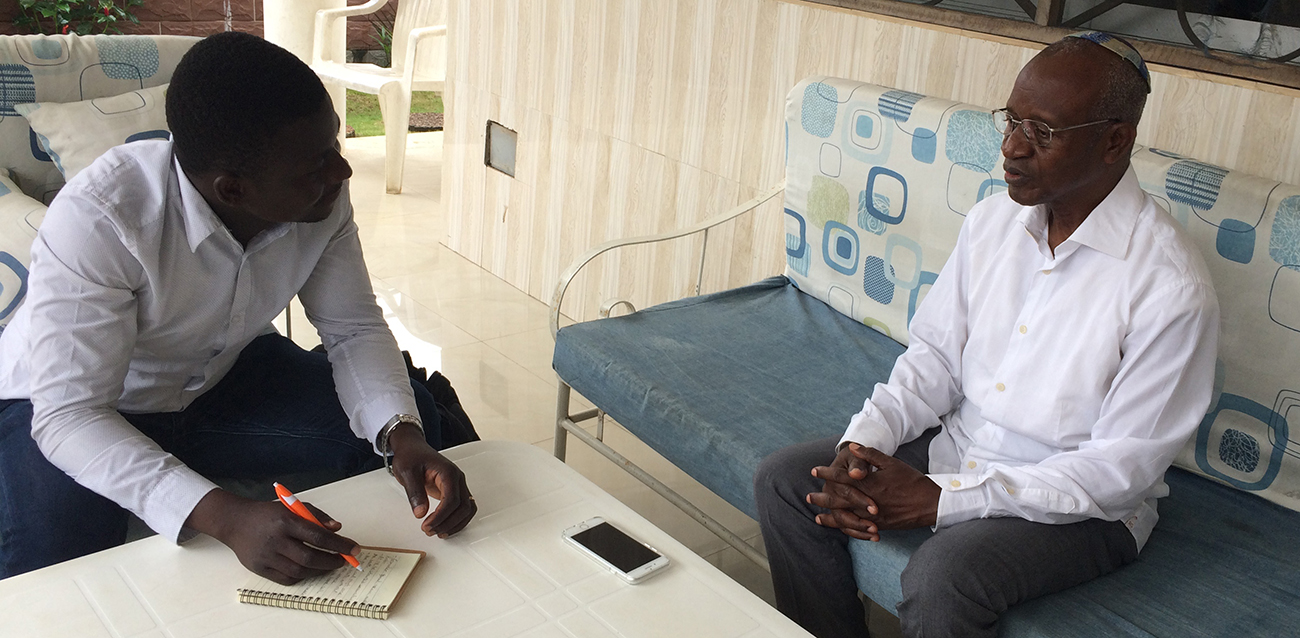Growing up in northeastern Ghana, Francis Abugbilla witnessed regional conflict throughout his childhood. Two ethnic groups clashed repeatedly, dating back to pre-colonial times. Today, as a doctoral student in the UW’s Jackson School of International Studies, Abugbilla is working toward lasting solutions to such conflicts.
That may be a tall order, but Abugbilla is no stranger to seemingly insurmountable challenges. Raised in a small farming community with no electricity, schools, or clinics, he walked hours a day to attend school in another village. He didn’t encounter a computer until high school. But he excelled academically, and continued on to Ghana’s University of Cape Coast to study French with a minor in English.

It was during his undergraduate years that Abugbilla’s interest in conflict resolution intensified. In 2010, with thousands of refugees from war-torn Côte d’Ivoire pouring into Ghana seeking asylum, he and his university friends founded Friends of the United High Commission for Refugees (UNHCR) on campus. Abugbilla, fluent in French, was often enlisted to bridge communication between the Ghanaians and the Ivorian refugees. Through the experience, he became interested in the root causes of violence and mechanisms for reconciliation.
Almost a decade later, Abugbilla continues to study conflict resolution, with the Ivorian civil wars as his focus. He explains that tensions in Côte d’Ivoire escalated after the country transitioned from a one-party state to a multi-party state in 1990, with parties forming based on ethnic divides. The quest for political power has since led to two civil wars, complicated by political actors outside Côte d’Ivoire with strategic interests in the region.
Political leaders and perpetrators should be honest and not economical with the truth.
With Côte d’Ivoire now recovering from those conflicts, Abugbilla is researching how the country is attempting to heal its deep societal wounds. “Post-conflict societies usually adopt principally two mechanisms — restorative justice and retributive justice — to rebuild peace and reconcile the people,” Abugbilla explains. “In restorative justice, partial or total amnesty is given for perpetrators to come forward and tell the world the crimes they committed. Victims, having heard the perpetrators acknowledge their crimes, will forgive and reconcile. Advocates of the other mechanism, retributive justice, argue that amnesty promotes a culture of impunity. They believe that perpetrators should be tried and sentenced if found guilty.”

Abugbilla is interested in post-conflict societies that adopt these seemingly incompatible mechanisms concurrently, and the impact that has on reconciliation. To that end, he visited Côte d’Ivoire last summer to interview religious leaders and others about their role in the conflicts and reconciliation. One surprising focus has been a small Jewish congregation whose leader has made strides in healing rifts among its members.
“The community is engaged in micro-level peacebuilding,” says Abugbilla. “The leader made known to his congregants that they should seek peace because it is one of the names of God — Shalom. He alluded to the Talmudic view of the destruction of the second temple in Jerusalem as a result of the hatred among fellow Jews. Using this analogy, he admonished members to reject hatred among themselves, whatever the motive may be, and seek social cohesion. The message of peace changed the attitude of members toward each other and led to harmonious living among members, with a multiplicative effect as members have replicated the teachings in their families and communities.”
To pursue this research in Côte d’Ivoire, Abugbilla received a Stroum Center Opportunity Travel Grant from the Jackson School’s Stroum Center for Jewish Studies. Other support Abugbilla has received at the UW includes a Henry M. Jackson Doctoral Fellowship, a Jackson School Diversity Fellowship, the Ottenberg-Winans Fellowship from the Jackson School’s African Studies Program, a Center for Human Rights Graduate Fellowship, a Chester Fritz International Research and Study Fellowship, and a grant from the Marcy Migdal Fund for Educational Equality.

“These fellowships mean that the funders recognize potentials and are helping me unearth them,” says Abugbilla. “Without this support, my research would not have been possible. I am glad that the funders have seen the importance of my research and of supporting me to make an impact in the world.”
Abugbilla also has found mentorship to be invaluable, most notably the support of his dissertation chair, Nathalie Williams, associate professor of international studies and sociology. “While I’m in the field in Côte d’Ivoire, she calls to check on me, offering academic and moral support,” says Abugbilla. “She goes the extra mile to see me succeed.”
Abugbilla plans to dive into the policy world after receiving his doctoral degree, possibly with international organizations like the United Nations or the African Union. He has no illusions about the difficulty of his chosen field, having learned from his research and his childhood experiences that peace can be fragile and fleeting.
“What has surprised me the most is that the Ivorian political elites who engineered these armed conflicts haven’t learned their lessons yet,” says Abugbilla, who has observed politicians favoring acerbic discourse over acknowledgment of past mistakes. Given their tone, he believes another conflict is likely to erupt.
"Political leaders and perpetrators should be honest and not economical with the truth,” he says. “For a lasting peace, both sides must genuinely acknowledge the ills of the past, see the humanity in each other, forgive, and envision a collective future.”
More Stories

AI in the Classroom? For Faculty, It's Complicated
Three College of Arts & Sciences professors discuss the impact of AI on their teaching and on student learning. The consensus? It’s complicated.

Bringing Music to Life Through Audio Engineering
UW School of Music alum Andrea Roberts, an audio engineer, has worked with recording artists in a wide range of genres — including Beyoncé.

A Love of Classics and Ballroom
Michael Seguin studied Classics at the UW and now owns Baltimore's Mobtown Ballroom. The two interests, he says, are more connected than they might seem.